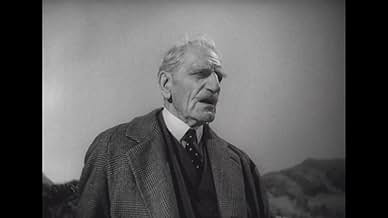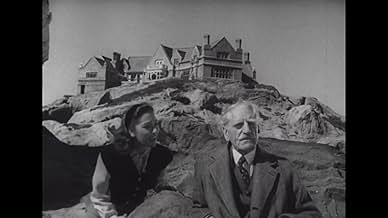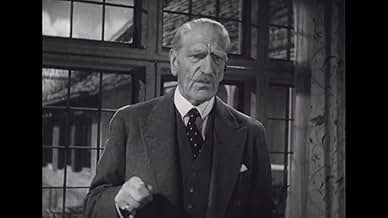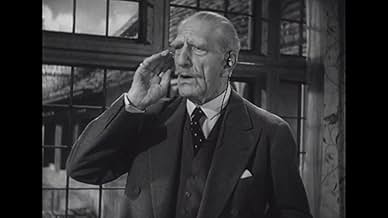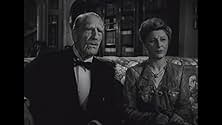VALUTAZIONE IMDb
7,4/10
17.630
LA TUA VALUTAZIONE
Sette ospiti, una segretaria appena assunta e due membri del personale sono riuniti in una casa padronale su un'isola isolata da un ospite assente sconosciuto e vengono uccisi uno per uno.Sette ospiti, una segretaria appena assunta e due membri del personale sono riuniti in una casa padronale su un'isola isolata da un ospite assente sconosciuto e vengono uccisi uno per uno.Sette ospiti, una segretaria appena assunta e due membri del personale sono riuniti in una casa padronale su un'isola isolata da un ospite assente sconosciuto e vengono uccisi uno per uno.
- Regia
- Sceneggiatura
- Star
- Premi
- 1 vittoria in totale
C. Aubrey Smith
- Gen. Sir John Mandrake
- (as Sir C. Aubrey Smith)
Recensioni in evidenza
All right, I'm not going to bother with the movie's strengths, as they are covered by every other reviewer here. What I want to talk about is the one area where I think director Rene Clair missed the boat: mood.
The book is absolutely chilling, and manages to have you jumping at noises in the night far better than most any of today's attempts at horror writing. The movie, however, has a campy, needlessly humorous feel which detracted strongly from my enjoyment. An example? Casting Harry Thurston as the boatman. His is one of the first faces we see, and it is twisted into the best version of a Bud Abbott facial expression that he could muster. Mischa Auer's performance was ridiculous to the extreme, and made his character neither believable nor endearing. There are a few other gripes I have, but they're of the same ilk, so I'll just say that this reasonably faithful portrayal could have been one of the greatest mystery thrillers ever if it had been taken a little more seriously.
The book is absolutely chilling, and manages to have you jumping at noises in the night far better than most any of today's attempts at horror writing. The movie, however, has a campy, needlessly humorous feel which detracted strongly from my enjoyment. An example? Casting Harry Thurston as the boatman. His is one of the first faces we see, and it is twisted into the best version of a Bud Abbott facial expression that he could muster. Mischa Auer's performance was ridiculous to the extreme, and made his character neither believable nor endearing. There are a few other gripes I have, but they're of the same ilk, so I'll just say that this reasonably faithful portrayal could have been one of the greatest mystery thrillers ever if it had been taken a little more seriously.
No Agatha Christie story has ever been made into a better movie than this one. The movie has the altered ending from the book (which I'm told was changed by Christie for the stage version because let's face it. The book's ending would never *ever* work in a dramatized setting, film or stage) and the character of Tony Marston has become a Russian prince to accomodate the casting of Mischa Auer, but apart from that Christie's book has been flawlessly translated right down to the last detail. The look, the settings, the characters, all of it is just right. There are also some wonderfully comedic performances that veer into some delicious black comedy at times (my favorite being Louis Hayward's bemused response to Roland Young's bumbling deductions: "And then he takes the chopper and splits open his own cranium. Fact. I'd like to see you do that yourself.") About the only casting flaw is June Duprez, who is woefully bland and dull as Vera Claythorne, the lead female character.
Out of the four film versions I watched thus far (the others being 1965, 1974, 1989 and I'm NOT counting the copious amount of rip-offs and imitations), this oldest version of Agatha Christie's monumental novel/stage play "Ten Little Indians" is inarguably the most memorable, sophisticated and superior! "And Then There Were None" simply forms the definition of a good old-fashioned and absorbing murder-mystery, complete with dazzling dialogs, exquisite acting performances and sublime plot twists that keep you guessing until the very end of the film. Perhaps it isn't as sinister and intense as I had hoped, but the whodunit-aspect keeps you glued to the screen at all times and there's a surprisingly large amount of unexpected macabre humor to compensate for the lack of thrills. The plot is world famous, but just in case you never heard of Agatha Christie before: ten people with no discernible connection are invited by an unknown host to spend the weekend at his/her isolated mansion on a private island off the British coast. Instead of meeting their host – the peculiar U.N. Owen – at the dinner table, they have to listen to a record with a strange voice accusing each and every one of them of a crime they didn't get punished for. Shortly after, they're being murdered one by one in imaginative methods that resemble the lyrics of the "10 Little Indians" nursery rhyme. After discovering they are the only ones on the island, the continuously shrinking group realizes that the killer must be one of them and becomes extremely suspicious. It's a downright beautiful and enchanting version, massively benefiting from René Clair's surefooted direction and the devoted performances of a terrific ensemble cast; including the almighty Walter Huston, Richard Haydn and C. Aubrey Smith. What I personally love most about 40's films are the intellectual, extended and almost poetic dialogs, and this film naturally features plenty of them. Being a forties' flick, you naturally shouldn't expect the murders to be graphical or even shown on screen. Still, there are a handful of suggestive and brutally playful sequences, including death by falling chimney. Together with the flamboyant 1974 adaptation of "Murder on the Orient Express", this is presumably the best Agatha Christie material turned into film.
Why quibble about the ending? I know it's not the same as the book's final scene, but since Agatha Christie herself changed it for the stage version--sensibly (because the book's ending doesn't work dramatically)--there's no reason to feel cheated. It's still one of the cleverest ideas for a mystery--ten people invited to an old house by the sea so that an unknown host can dispose of them one by one. Under Rene Clair's direction, there's a great deal of humor thrown in. Add to that, enjoyable performances from a first-rate cast of character actors--Barry Fitzgerald, Judith Anderson, Walter Huston, Louis Hayward and the always dependable Richard Haydn as Rogers, the butler. June Duprez is the only weakness in the cast members, showing little emotion throughout. The atmosphere is brooding, the chills are delicious, and you can rewind your VHS print to spot Agatha's give-aways. One of the best mysteries of all time, but don't waste your time on the later remakes. This version is the genuine product.
Judge Francis J. Quinncannon (Barry Fitzgerald), Dr. Edward G. Armstrong (Walter Huston), Philip Lombard (Louis Hayward), Detective William Henry Blore (Roland Young), the secretary Vera Claythorne (June Duprez), Prince Nikita 'Nikki' Starloff (Mischa Auer), Gen. Sir John Mandrake (Sir C. Aubrey Smith) and Emily Brent (Judith Anderson) are invited by the mysterious Mr U. N. Own to spend the weekend in an island and they are hosted by the newly-hired butler Thomas Rogers (Richard Haydn) and his wife and housekeeper Ethel Rogers (Queenie Leonard).
Thomas explains that Mr. Own will arrive later and following the instructions of his master, he plays a record where the host explains that all of them have been accused of murder. Further, they realize that none of them actually knows Mr. Own. Vera plays a song about Ten Little Indians on the piano and they see a decoration on the table with ten Indians. Soon they are killed one-by-one while the each Indian vanishes from the decoration. Who might be the mysterious killer?
"And Then There Were None" is an engaging thriller based on a novel and a stage play by Agatha Christie. René Clair makes an excellent theatrical but never boring film, supported by magnificent performances and a delightful screenplay with tense and humorous situations. My vote is eight.
Title (Brazil): "O Vingador Invisível" ("The Invisible Avenger")
Thomas explains that Mr. Own will arrive later and following the instructions of his master, he plays a record where the host explains that all of them have been accused of murder. Further, they realize that none of them actually knows Mr. Own. Vera plays a song about Ten Little Indians on the piano and they see a decoration on the table with ten Indians. Soon they are killed one-by-one while the each Indian vanishes from the decoration. Who might be the mysterious killer?
"And Then There Were None" is an engaging thriller based on a novel and a stage play by Agatha Christie. René Clair makes an excellent theatrical but never boring film, supported by magnificent performances and a delightful screenplay with tense and humorous situations. My vote is eight.
Title (Brazil): "O Vingador Invisível" ("The Invisible Avenger")
Lo sapevi?
- QuizThis movie, while officially based on the novel by Dame Agatha Christie (as per the onscreen credits)], has an ending that resembles her later stage version. While the identity of the murderer is the same in both versions, the survivors of the tale in each are different.
- BlooperIn a flashback, Mr. Owen kills the seventh victim, takes a drink from a flask, and then tosses the flask away, leaving the stopper open. However, when two characters find the flask the next day, the stopper is closed.
- Citazioni
Emily Brent: Very stupid to kill the only servant in the house. Now we don't even know where to find the marmalade.
- Curiosità sui creditiThe first line of the nursery rhyme appears onscreen - "Ten Little Indians Went Out To Dine...." - superimposed over a set of small statues of Native Americans - this is immediately followed by the film's title "And Then There Were None".
- Versioni alternativeA computer colorized version of this film, made in the late 1980s, also exists.
I più visti
Accedi per valutare e creare un elenco di titoli salvati per ottenere consigli personalizzati
Dettagli
- Tempo di esecuzione1 ora 37 minuti
- Colore
- Proporzioni
- 1.37 : 1
Contribuisci a questa pagina
Suggerisci una modifica o aggiungi i contenuti mancanti

Divario superiore
By what name was Dieci piccoli indiani (1945) officially released in India in English?
Rispondi


